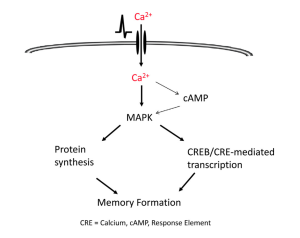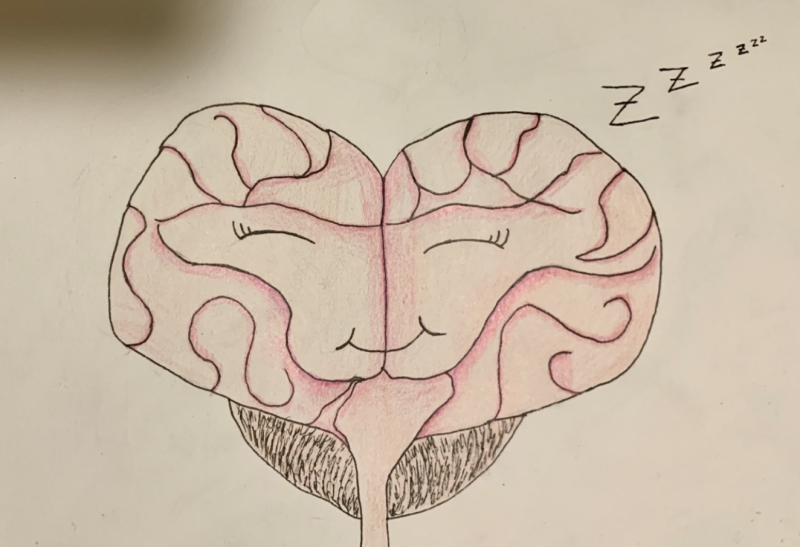Artstract by Jessica Howard
The Stages of Sleep
There are four different sleep stages that are identified by the type of brain waves present during each stage (Patel, Reddy, Shumway, & Araujo, 2022). These brain waves range from high frequency to lower frequencies. The highest frequency wave is called the beta waves with the next highest being alpha waves. These waves are both present during wakefulness.
Stage 1 of sleep, also know as non-REM 1, is the lightest stage of sleep and is marked by starting as alpha waves and moving into low voltage theta waves. During this stage there is still muscle tone and regular breathing rates.
Stage 2 of sleep is non-REM 2 and is a deeper sleep than non-REM1. Theta waves are the predominant brain wave during this stage. There are also sleep spindles and K complexes present during this stage. Sleep spindles are short bursts of neurons firing that possibly play a role in memory consolidation. K Complexes are brief delta waves, the longest of the brain waves, that are associated with maintaining sleep.
Stage 3 of sleep is the deepest stage of non-REM sleep. During this stage there are Delta waves which are the lowest frequency of the brain waves. During this stage the body can repair tissue and strengthen its immune system. This is also the most difficult stage to awaken from, and when people are awakened during this stage they experience a state of mental grogginess.
REM sleep stands for Rapid Eye Movement and is very different from the other stages of sleep. During REM sleep beta waves are present and is therefore not considered to be a restful stage of sleep. However, this is the stage where dreams occur. During this stage the muscles are paralyzed except for the eyes and diaphragm breathing muscles (Patel, et. al., 2022).
Why is sleep important
Sleep plays several functions in the overall health of the body. It gives the body a chance to rest and heal from the past day. But sleep also gives the brain a chance to sort through all the new memories that it has experienced and prepare for the new experiences of tomorrow. REM sleep and the deep stages of non-REM sleep seem to be the most important for consolidating the memories of that day (Wein, 2017). This is the time where the hippocampus (which is the part of your brain in charge of memory) is working to connect all of these memories together and get them stored permanently (Xia & Storm, 2017). Specifically, it seems that certain pathways inside the cells of the hippocampus are important for the formation of new proteins related to these old memories, which is how the memories seem to outlive the original proteins they were connected to. Pathways such as the MAPK cascade are activated by calcium (Ca) dependent NMDA receptors, which allow Ca to enter the cell when activated. As Ca enters into the cell through these receptors it depolarizes the cell which starts the MAPK pathway. As the cell depolarizes, or gains a more positive charge, this starts a series of reactions. Protein kinases, which are just enzymes, start to phosphorylate (or add a phosphorus molecule) to other protein kinases called Ras, Raf, MEK, and ERK. The phosphorylation of these enzymes causes them to change shape to activate each other, in the final step is the phosphorylation of a transcription factor called CREB. CREB can then enter into the nucleus and start gene transcription to make a new protein. This protein is then associated with a memory because it is from the hippocampus (Xia & Storm, 2017).

Xia, Z., & Storm, D. (2017). Role of circadian rhythm and REM sleep for memory consolidation. Elsevier: Neuroscience Research 118. 13-20. http://dx.doi.org/10.1016/j.neures.2017.04.011.
Though the light stages of non-REM sleep also play an important role (Wein, 2017). These stages seem to be most connected to getting the brain ready to receive new information when it wakes up. When these stages are cut short the brain not only doesn’t have enough time to consolidate the old memories, it also doesn’t have time to prepare to receive the new information. This can drastically reduce your ability to retain information the following day, which is a big problem for students (Wein, 2017).
How can you improve your sleep
The best way to improve your quality of sleep and the amount of sleep you get is to maintain good sleep hygiene (Hershner & Shaikh, 2021). Sleep hygiene is just a term used to describe healthy sleep habits. It is important that you get enough sleep every night, while the exact amount of sleep varies from person to person it’s generally best to get 7-8 hours of sleep per night. It’s also important to remain consistent with your sleep schedule every single day. Try to go to bed and get up at the same times, even for the weekends and on vacation. If you have trouble falling asleep it may help to not have any caffeine after 12 pm and to turn off all your electronics 20 minutes before actually going to bed. Another thing you can do is to have an established bedtime routine that you do every single night. This will help to signal to your brain that it’s time for sleep, and it can start releasing hormones such as melatonin to make you sleepy (Hershner & Shaikh, 2021).
There of course are many more things you can try to help you improve your sleep quality, but the tips listed above can be a good place to start. It can by really hard to change your sleepy habits, especially when it comes to using electronics and staying up to late. But by sticking with a regular routine your brain will eventually become acclimated and it will become easier to get more higher quality sleep.
References
Hershner, S., & Shaikh, I. (Eds.). (2021, April 2). Healthy sleep habits. Sleep Education. Retrieved March 27, 2023, from https://sleepeducation.org/healthy-sleep/healthy-sleep-habits/
Patel, A. K., Reddy, V., Shumway, K. R., & Araujo, J. F. (2022, September 7). Physiology, sleep stages – statpearls – NCBI bookshelf. Retrieved March 28, 2023, from https://www.ncbi.nlm.nih.gov/books/NBK526132/
Wein, H. (Ed.). (2017, July 13). Sleep on it. National Institutes of Health. Retrieved March 27, 2023, from https://newsinhealth.nih.gov/2013/04/sleep-it#:~:text=Memories%20seem%20to%20become%20more,may%20help%20with%20problem%2Dsolving.
Xia, Z., & Storm, D. (2017). Role of circadian rhythm and REM sleep for memory consolidation. Elsevier: Neuroscience Research 118. 13-20. http://dx.doi.org/10.1016/j.neures.2017.04.011.
